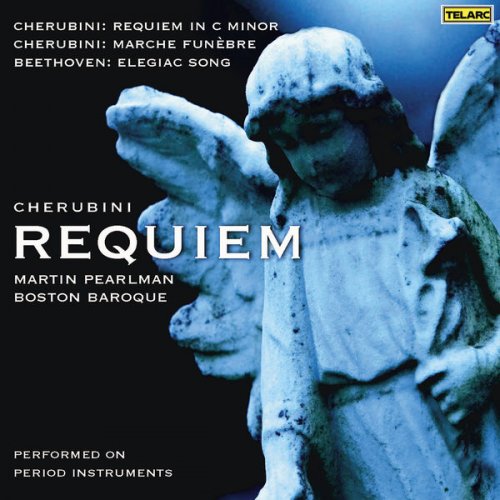
Boston Baroque and Martin Pearlman - Cherubini: Requiem in C Minor & Marche funèbre - Beethoven: Elegiac Song, Op. 118 (2007)
BAND/ARTIST: Martin Pearlman, Boston Baroque
- Title: Cherubini: Requiem in C Minor & Marche funèbre - Beethoven: Elegiac Song, Op. 118
- Year Of Release: 2007
- Label: Telarc
- Genre: Classical
- Quality: FLAC (tracks)
- Total Time: 50:24
- Total Size: 198 MB
- WebSite: Album Preview
Tracklist:
1. Beethoven: Elegiac Song, Op. 118 (05:47)
2. Requiem in C Minor : Cherubini: Requiem in C Minor - I. Introit - Kyrie (07:29)
3. Requiem in C Minor : Cherubini: Requiem in C Minor - II. Graduale (01:15)
4. Requiem in C Minor : Cherubini: Requiem in C Minor - III. Sequence. Dies Irae (07:51)
5. Requiem in C Minor : Cherubini: Requiem in C Minor - IVa. Offertory. Domine Jesu (05:54)
6. Requiem in C Minor : Cherubini: Requiem in C Minor - IVb. Offertory. Hostias (06:45)
7. Requiem in C Minor : Cherubini: Requiem in C Minor - V. Sanctus - Benedictus (01:13)
8. Requiem in C Minor : Cherubini: Requiem in C Minor - VI. Pie Jesu (03:24)
9. Requiem in C Minor : Cherubini: Requiem in C Minor - VII. Agnus Dei (05:28)
10. Cherubini: Marche funèbre (05:14)
1. Beethoven: Elegiac Song, Op. 118 (05:47)
2. Requiem in C Minor : Cherubini: Requiem in C Minor - I. Introit - Kyrie (07:29)
3. Requiem in C Minor : Cherubini: Requiem in C Minor - II. Graduale (01:15)
4. Requiem in C Minor : Cherubini: Requiem in C Minor - III. Sequence. Dies Irae (07:51)
5. Requiem in C Minor : Cherubini: Requiem in C Minor - IVa. Offertory. Domine Jesu (05:54)
6. Requiem in C Minor : Cherubini: Requiem in C Minor - IVb. Offertory. Hostias (06:45)
7. Requiem in C Minor : Cherubini: Requiem in C Minor - V. Sanctus - Benedictus (01:13)
8. Requiem in C Minor : Cherubini: Requiem in C Minor - VI. Pie Jesu (03:24)
9. Requiem in C Minor : Cherubini: Requiem in C Minor - VII. Agnus Dei (05:28)
10. Cherubini: Marche funèbre (05:14)
In the early nineteenth century, Luigi Cherubini's Requiem in C minor (1816) was often compared to Wolfgang Amadeus Mozart's Requiem in D minor, which preceded it by 15 years. In our own time, the recordings of these works by Martin Pearlman and the Boston Baroque afford us an opportunity to consider them side by side; because both are historically informed performances on authentic instruments, of works that are similar in substance and form, comparisons are reasonable. Of course, this 2007 Telarc presentation of Cherubini's Requiem has the same splendid sound and exceptional reproduction of the Mozart recording, which was released in 1995 by the same label. The performances in both cases are extraordinary: Pearlman and his ensemble are especially sensitive in sacred repertoire, and the expressions of both the choir and the orchestra approach the sublime. However, there is an important difference between the Mozart work and the Cherubini, insofar as the Requiem in D minor is a bona fide masterpiece, while the Requiem in C minor is merely a respectable piece of late Classical (or early Romantic) orthodoxy. Cherubini was not exploring new musical ground in his Requiem -- composed as a memorial to Louis XVI and Marie Antoinette, it had to be conservative in style -- and the influences of church and monarchy are undeniably felt in this work's austerity and stiff respectability. Also, where Mozart's vocal soloists give a distinctly personal and comforting quality to his mass for the dead, Cherubini instead uses the choir tutti throughout, perhaps to eliminate the expression of individuality. Cherubini's music is at times impressive and interesting -- sometimes even operatic in character -- but it is less than moving or spiritually uplifting, and even this committed and skilled rendition fails to make it seem much more than utilitarian church music. Framed by Ludwig van Beethoven's soothing Elegiac Song, Op. 118, and Cherubini's theatrically grim Marche funèbre, the Requiem in C minor comes across as a minor choral work that deserves to be heard occasionally, but should not be ranked as highly as Mozart's swan song.
As a ISRA.CLOUD's PREMIUM member you will have the following benefits:
- Unlimited high speed downloads
- Download directly without waiting time
- Unlimited parallel downloads
- Support for download accelerators
- No advertising
- Resume broken downloads


